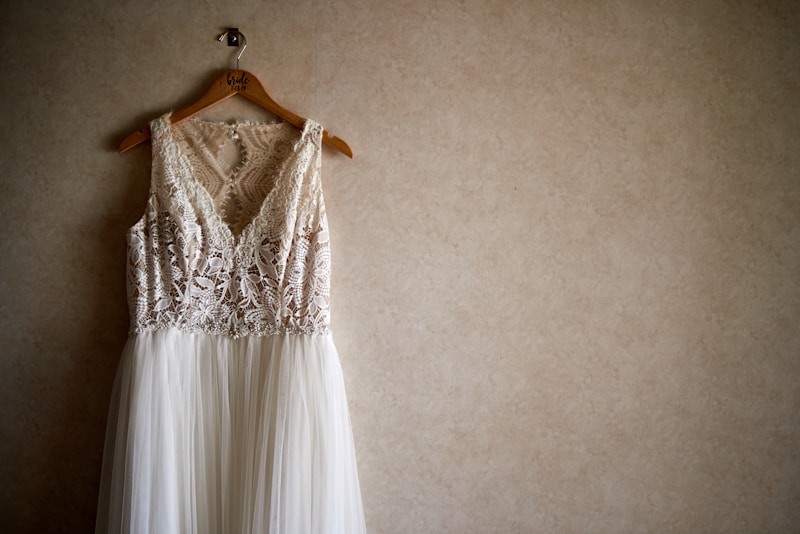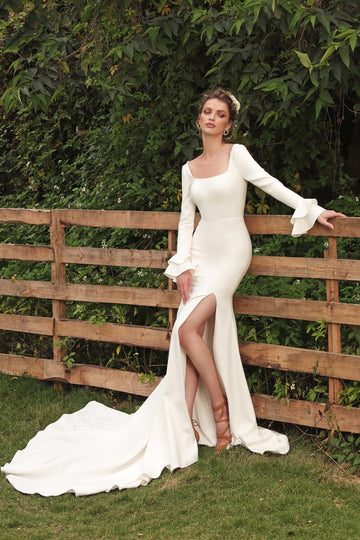The Ultimate Guide to the Process of Customizing a Wedding Dress
The Ultimate Guide to the Process of Customizing a Wedding Dress
Every bride dreams of wearing the perfect wedding dress on her special day. However, not every off-the-rack dress meets that dream. That's where the process of customizing a wedding dress steps in. In this guide, we'll explore the various stages involved in creating a bespoke wedding gown, discuss the benefits of customization, and provide tips on ensuring your vision comes to life.
Why Customize Your Wedding Dress?
Weddings are deeply personal events that reflect the couple’s lifestyle, tastes, and love story. Choosing to customize your wedding dress can result in a gown that is uniquely yours. Here are some compelling reasons to consider:
- Unique Design: Customization allows you to design a dress that embodies your style, whether it’s bohemian, classic, or modern.
- Perfect Fit: A tailored dress will fit your figure perfectly, ensuring comfort and confidence as you walk down the aisle.
- Quality Materials: You can choose high-quality fabrics and embellishments that suit your aesthetic and budget.
- Emotional Connection: A personalized dress often carries sentimental value, connecting you to your family history or cultural heritage.
The Steps in The Process of Customizing a Wedding Dress
Here is a systematic overview of the process of customizing a wedding dress:
| Step | Description |
| 1. Research & Inspiration | Collect ideas and inspiration from magazines, websites, and social media platforms like Pinterest. |
| 2. Budgeting | Determine your budget, keeping in mind the cost of materials, labor, and any additional alterations needed. |
| 3. Finding a Designer | Choose a designer whose style aligns with your vision, and set up consultations to discuss ideas. |
| 4. Initial Consultation | Discuss your preferences and inspirations with your designer in-depth. |
| 5. Fabric Selection | Select the fabrics that will bring your vision to life while also considering comfort and durability. |
| 6. First Fitting | Try on a basic version of your dress to assess fit and make initial adjustments. |
| 7. Subsequent Fittings | Attend fittings to refine the dress, test different fabrics, and see how details like beading and lace look. |
| 8. Final Touches | Review the completed dress and discuss any last-minute changes. |
| 9. Delivery | Take possession of your beautiful custom wedding dress and prepare for your big day! |
Step 1: Research & Inspiration
Start your customization journey by gathering inspiration. Websites like Pinterest and Instagram are great for discovering trends and styles. Look for wedding dress galleries and save images that resonate with your style. Additionally, bridal magazines often feature real weddings and behind-the-scenes of dress-making, providing further insight into what might work for you.

Step 2: Budgeting
Your budget is crucial in the process of customizing a wedding dress. Determine how much you can invest in your gown. Custom wedding dresses can range widely in price depending on the designer, materials used, and labor involved. On average, budgeting between $1,000 to $5,000 can cover most aspects of the customization process—but always consider potential additional costs.
Step 3: Finding a Designer
Choosing a designer is one of the most crucial steps in this process. Look for someone whose portfolio speaks to you and who can execute your vision. Don't hesitate to schedule multiple consultations to find the perfect match. Ask about their experience with customization, discuss timelines, and get a feel for their personality, as you will be working closely together.
Step 4: Initial Consultation
During the initial consultation, express your ideas clearly. Bring your inspirational images and be open about any specific features you want, such as neckline preferences or sleeve types. Consider discussing practical elements such as ease of movement, especially if you plan to dance the night away.
Step 5: Fabric Selection
The type of fabric you choose can dramatically affect the dress's look and feel. Some popular options include silk, satin, lace, and tulle. Discuss with your designer the best fabrics for your desired style, season, and comfort level. You might want a heavy satin for a winter wedding or a light chiffon for a summer celebration.
Step 6: First Fitting
At the first fitting, you will try on a mock version of your dress. This fitting is essential for assessing how your design translates into a real garment. Make sure to provide feedback on fit and comfort—this stage helps identify necessary adjustments.
Step 7: Subsequent Fittings
Your designer may require several fittings to perfect the gown. Each fitting is your opportunity to see how the adjustments are progressing. Be open to constructive criticism and suggestions from your designer, as they have experience in what will look best on you.
Step 8: Final Touches
Once you're satisfied with the fit and style, the last stage is to finalize any little details, like buttons, lacework, or other embellishments. Make sure to check for any details you may have overlooked, such as the placement of beading or embroidery.
Step 9: Delivery
After all fittings are complete and you’ve given the final approval, your gorgeous custom wedding dress will be ready for delivery. Schedule a pickup or a delivery date that gives you enough time before your wedding for any last-minute adjustments.
Common Concerns & Questions
When it comes to the process of customizing a wedding dress, brides often have similar concerns. Here are a few frequently asked questions:
- How long does it take to customize a wedding dress? The entire process typically takes 4-6 months, depending on the designer's workload and the complexity of your design.
- Can I bring my own fabric? Many designers allow you to provide your own fabric, but confirm this during your initial consultation.
- What if I gain or lose weight before the wedding? Schedule fittings at different intervals leading up to your wedding date to accommodate any changes.
- How much should I budget for alterations? Generally, you should budget an additional 10-20% of the dress cost for any necessary alterations.
Conclusion: Bringing Your Vision to Life
Now that you understand the process of customizing a wedding dress, you can approach your dress-making journey with confidence. Remember to enjoy each step along the way, from initial inspiration to final fittings. As your wedding day approaches, your custom dress will not only be a reflection of your unique style but also a piece of art crafted with care and love.
Don't forget to communicate openly with your designer, prioritize your comfort, and keep your budget in check. Your dream wedding dress awaits, and the customization process is an exciting opportunity to bring your vision to life!
